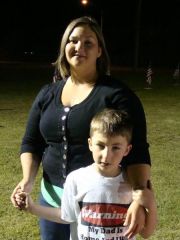Search the Community
Showing results for '"weight gain"'.
Found 15,862 results
-
I had RNY in March of 2005. I lost a total of 110lbs and maintained that for about 5 yrs. then I noticed my weight increasing about 10lbs a year and at about year 8 I started noticing changes in my tolerance for food, IBS, and the ability to continually eat with no restrictions and also no Satiety from food. So at year 10 finally went to see what was going on and found out that I had an enlarged storms which was causing all the issues with my eating and weight gain. This is regardless of eating good or bad. So after about 4 months of tests with a Gastroenterologist's it was decided that I needed a revision. I am currently a little more than a week out from my revision. Bottom line follow the rules of the tool and pay attention to your body definitely follow up annually with Doctor.
-


How Do I Get Food Unstuck?
Cocoabean replied to kimmym's topic in POST-Operation Weight Loss Surgery Q&A
I never thought to ask those questions either! Once you are at proper restriction you need fewer and fewer fills. You may have been gaining for a couple of reasons. You started eating higher caloric foods or larger amounts of foods. The reason for larger amounts of foods with the same fill can be that as you lose weight, you lose it everywhere, including the fat around your stomach beneath your band. When that happens, your band feels looser. Like what happens to a belt as you lose weight. When your band feels looser you get hungrier. For me hungrier means I eat more, eating more means weight gain. I seem to just get a teensie tune up fill yearly. About 0.25cc. It's good though, because I see my surgeon this way, and he checks everything out. He does an upper GI each time to check placement is still good. I had my last top-off in September. According to my surgeon the older bands seemed to have a bit of Fluid that seeps through the bladder of the bands over time. Not so much in the newer bands. He said my AP Standard 10cc band is one of the newer ones. For me, I've reached a fill level where what I eat is appropriate to maintain my weight. At this point, I could not take any more fill in my band. I am far from the capacity of it. I have a 10cc band, I have less than 7cc in it, not sure of the total. My surgeon has the total in his notes, it doesn't really matter to me, what matters to me is that I can eat and maintain my weight. -
Yeah but the flip side of that is...they will pay more down the line due to a lot of serious health issues that comes along with being morbidly obese. That was one of the reasons Medicare started covering bariatric surgery. Yeah they mighy shell out (or more like the tax payers will shell out) a big chunk off the bat, but if that lowers BP, cholesterol, DM and so on, then its worth it for them. Its a win win for both parties. But I agree with them finding canidates who are serious about it. I was never denied, but I called Cigna and was active with them and my PCP and the bariatric doctors office. Plus I'd had them back when I was thinner, so they watched all the weight pile on and all the comorbidities that went with the weight gain so maybe that's why they immediately approved me...
-
From the album: before pics
-


Transporting Protein Shakes to Work?
Stevehud replied to Annek2014's topic in Protein, Vitamins, and Supplements
okay so youre using weight gain shakes? if so why use almond milk? it seems kind of weird to limit your calories when your trying to gain weight. -


Revision due to GERD
jlalexan02 replied to Nurse Crystal's topic in Revision Weight Loss Surgery Forums (NEW!)
I'm in the same situation with sleeve in 2013 and now surgeon is suggesting a revision to bypass or LINX to help with the severe GERD. However, they strongly recommend bypass so I'm here to do all the research I can on the experience others have had with similar situations. Would love to have the GERD gone and weight loss would be nice but terrified that bypass will actually be way more painful than I am expecting and have worse side effects like weight gain and dumping and maybe I should just deal with the GERD. Feeling really confused and hoping this forum helps me come to terms with a decision. -
I have currently experienced weight gain due to stress eating during a divorce process. I had RNY gastric bypass in 2012. I lost nearly 80 lbs. My highest weight was 280 lbs before surgery and support group. My lowest weight was 176 about 8 months after surgery. I had emergency gallbladder surgery in 2014. I had severe complications with internal bleeding and bile drainage. 5 surgeries were performed in a 2 month period to fix me. Soon after my gallbladder surgery, my husband and I separated. And I started seeing myself decline. Under the advice of my gynecologist, I had my tubes tied to prevent pregnancy. Slowly, I began to become sluggish and lazy, and so did my metabolism. I have gained 28 pounds back, and I am not happy. I blame myself most days. Please provide any information that would help. Sent from my SGH-T399N using the BariatricPal App
-
I am with you on the first 6 months. I lost my maximum weight the first 3-6 months. Then it slowed down when I reached 175 lbs. Then I kept it off, until I had complications with internal bleeding from gallbladder surgery. Then, soon after that, I had my tubes tied and I started to gain. I don't drink carbonated drinks. But, I do drink sweet tea occasionally. I do live in the south, so sweet tea is our choice of refreshment. Lol I am NOT complaining about my surgery at all, it has helped me keep my diabetes under control. My biggest problem right now is carbohydrates. Mostly snacking in between meals. Ive started taking CLA and Fat Burner along with a lean muscle mass supplement. And drinking at least 3 route 44 waters a day from Sonic. Lol hahaha I really love the crushed ice, reminds me of a slushie. I think its a mental thing, the crushed ice makes the Water exciting. My workout schedule needs tweaking. Mostly hit and miss when it comes to the gym. I have been trying to start walking around every day at our local park. And along with the water, and whatnot, I have noticed a significant impact on my bloating and weight gain. Starting to feel light on my feet again. I created a secondary page on Facebook, to use as an journal just between me and my counselor. I can keep up with my meals with posting about my meal with a picture. I need a few buddies on Facebook to keep me motivated though. Barbie Ann
-
I had surgery on the 2nd of April I was just wanting to know if the scale says I gained 2.4 lbs is that normal
-


Hello from central California
JennyLou replied to amandastephens's topic in Tell Your Weight Loss Surgery Story
I got great news today; I emailed my PCP yesterday that I would like her to send me to a bariatric specialist and she emailed me today that she referred me to the Bariatric information seminar. I didn't even have to go see her again. WE had discussed my weight gain at my last visit in February for a physical and lab work. I think it would be best for me to stay on my Kaiser insurance and not switch to my Blue Shield option. I guess that is step 1, I am on way down the Kaiser WLS roller coaster. What should I expect at the seminar? do they weigh me there? -


2-Week Pre-Op Liquid Diet? BRING IT ON!
HelloGoodbye posted a topic in PRE-Operation Weight Loss Surgery Q&A
Hi guys! I've been a lurker on here for a few months, but now that I am about 2 weeks away from my surgery (scheduled for May 21st), I decided to take the leap to become an official member of this forum! I'm in late my 20s and towering over 230 lbs. I was approved for surgery on the first try (partially due to my actual weight, but my hormone imbalance, G.E.R.D., and hiatal hernia definitely played a role in the approval as well... woohoo!) My relationship with food has completely catapulted in the last few years. I started seeing a therapist on-and-off for about 8 months now in hopes of getting to the bottom of my food addiction... It's a constant battle, but I'm learning so much and in the process, tweaking my eating habits so getting this surgery will be easier on my body and mind. Getting banded was never even a thought before last summer. I wouldn't have even been eligible because the bulk of my weight gain has occurred in the last 2 years. I know that this is only the beginning of my journey, and there won't be an easy road to take, but I'm ready to get behind the wheel! May 7th will be the first day of my liquid diet leading up to my surgery. I've been saying good bye to all of my favorite foods this entire weekend... Soda, pizza, fries, bread, potato chips, Pasta... Parting is such sweet sorrow, but I think once I start to hopefully lose weight, it won't even matter (right?!) So, in a nutshell, that's where I am in my life right now. I'm excited and eager but also VERY scared and nervous. I hope that I can seek comfort and advice from the members of this community, and I will try my best to to do the same for others!- 48 replies
-
I have Cushing's disease, which is caused by a tumor in my pituiatry gland. IMHO, the most obvious symptom is uncontrolable weight gain, but the "central obesity" and the hump are hard to miss. it has taken me litterally decades to get a proper diganosis, and treatment. I had at one time a large brain tumor, which died taking my of my pit with it. So, I cannot help but wonder what my life would be like if I'd gotten proper treatment. Treatment with respect, instead I was dismissed as fat and lazy, as a lier and cheater, since I couldn't possibly telling the truth about my food. It was only after getting banded and still not losing weight that I was able to get people to treat me seriously. And it's still been a battle. Cushing's isn't as rare as they want you to believe, it is only rarely diagnosed because most people are fat, hormonal, lazy women. They also insist that if you don't have every single symptom, you couldn't have it, if you come back with several high test results, then it must be a fluke. grrr
-


BMI of 21 getting gastric sleeve... thoughts?
iloveorganicmilk replied to iloveorganicmilk's topic in Gastric Sleeve Surgery Forums
I am 23. And I have had everything tested. Everything is normal. I think more than being a binge-eater, I am a volume eater. I just eat so much because I always loved to eat since I was little. I just tend to eat large amounts of anything. But I dont eat any of the foods most have mentioned. I don't binge on sweets or ice cream, or chips or crackers. Its more like if I'm out eating sushi, other people will just eat like 12 pieces, but i'll need to eat 24. or like when my friends are eating a 3 egg omelet i'll eat like a 6egg omelet LOL And then I start feeling extremely guilty and stressed that I ate so much that I'll try to relieve the stress by eating more (a vicious cycle!!!) which causes more weight gain and more stress. My life has been controlled by dieting ever since sophomore year in high school. I know that you all might think that i'm sounding a little anorexic here for wanting to stay thin, but really, 110-115 is considered a normal weight for height. Even my doctor (who is not my surgeon) approves. ahh if i could explain everything so that you guys can get a clearer picture of my situation I want to. but a post will lack the space to do so. Anyways. My surgeon has had a lot of success with low BMI patients like me (i'm not the only low bmi patient getting a vsg!!). Even patients with binge-eating and bulimia etc have had success with great reviews! I'm not going into this on a whim. Even lower bmi patients who were thinner than me have done well and were able to maintain a healthy weight. The reason im asking on this forum is because I understand that no matter if i feel 100% confident about my decision, its always smart to listen to other people's thoughts too. Again, thank you all for your guy's input. Its good to see what other people think about my choice -
Hello November 07 Bandsters, Apologies for being neglectful over the past while; time I updated you on my progress and issues. Weight Loss Plateau. After a fill in early February I enjoyed a few kg of weight loss, but then a long plateau with no loss. Noted I was eating and drinking slightly more; but nothing like the old pre-band Phil. Anyway a weight gain of 1 or 2 kg spurred me on to get another fill on Saturday 26 April. Loss of Restriction. While I was in for the fill, my doctor and I were discussing why we loose restriction after a fill. You know, feeling tight with great weight loss for one or two weeks then gradually the restriction lessens. Anyway we wondered if the band wasn’t holding the saline solution and if it was leaking out. To test this he syringed out the 5 cc already added to check it was still there and confirmed it was, at the same time he added 2 cc. Over Filled Experience. Interestingly the 2 cc on Saturday made me so tight that even a mouthful of Water made me sick. As soon as I left his office, while I was paying the account, I vomited up the test water (we don’t do fluro, just drink water to test the restriction). But I thought things would settle down and wasn’t too worried. Mind you I was uncomfortable. But by Monday afternoon I was feeling no different and was worried about dehydration, so I came in for an un-fill. Straight away I was able to drink water with no issues. The difference was immediate and quite dramatic. Since then I am still on liquids, but will try some well chewed solids this evening or tomorrow. Even with 1 cc extra (total 6 cc rather than 7cc) I feel tight; so I am expecting some good weight loss over the next few weeks. So we know the band is working, small adjustments are effective and it certainly holds pressure. Over All Weight Loss. I’m down 21.8 kg (48 lbs) so far and wearing size 97 cm (38”) trousers and shorts. Was able to buy some inexpensive sport shorts from a supermarket on the weekend. The old Phil used to struggle to find clothes to fit and they were premium price. I’ve been dumping old shirts and trousers and happily buying new smaller ones; what a nice problem. All the best with your own weight loss journey. QatarPhil.
-


found this on another forum ,what do you think?
nicki763 posted a topic in Tell Your Weight Loss Surgery Story
Pouch Rules for DummiesINTRODUCTION: A common misunderstanding of gastric bypass surgery is that the pouch causes weight loss because it is so small, the patient eats less. Although that is true for the first six months, that is not how it works. Some doctors have assumed that poor weight loss in some patients is because they aren’t really trying to lose weight. The truth is it may be because they haven’t learned how to get the satisfied feeling of being full to last long enough. HYPOTHESIS OF POUCH FUNCTION: We have four educated guesses as to how the pouch works: 1. Weight loss occurs by actually slightly stretching the pouch with food at each meal or; 2. Weight loss occurs by keeping the pouch tiny through never ever overstuffing or; 3. Weight loss occurs until the pouch gets worn out and regular eating begins or; 4 Weight loss occurs with education on the use of the pouch. PUBLISHED DATA: How does the pouch make you feel full? The nerves tell the brain the pouch is distended and that cuts off hunger with a feeling of fullness. What is the fate of the pouch? Does it enlarge? If it does, is it because the operation was bad, or the patient is overstuffing themselves, or does the pouch actually re-grow in a healing attempt to get back to normal? For ten years, I had patients eat until full with cottage cheese every three months, and report the amount of cottage cheese they were able to eat before feeling full. This gave me an idea of the size of their pouch at three month intervals. I found there was a regular growth in the amount of intake of every single pouch. The average date the pouch stopped growing was two years. After the second year, all pouches stopped growing. Most pouches ended at 6 oz., with some as large at 9-10 ozs. We then compared the weight loss of people with the known pouch size of each person, to see if the pouch size made a difference. In comparing the large pouches to the small pouches, THERE WAS NO DIFFERENCE IN PERCENTAGE OF WEIGHT LOSS AMONG THE PATIENTS. This important fact essentially shows that it is NOT the size of the pouch but how it is used that makes weight loss maintenance possible. OBSERVATIONAL BASED MEDICINE: The information here is taken from surgeon’s “observations” as opposed to “blind” or “double blind” studies, but it IS based on 33 years of physician observation. Due to lack of insurance coverage for WLS, what originally seemed like a serious lack of patients to observe, turned into an advantage as I was able to follow my patients closely. The following are what I found to effect how the pouch works: 1. Getting a sense of fullness is the basis of successful WLS. 2. Success requires that a small pouch is created with a small outlet. 3. Regular meals larger than 1 � cups will result in eventual weight gain. 4. Using the thick, hard to stretch part of the stomach in making the pouch is important. 5. By lightly stretching the pouch with each meal, the pouch send signals to the brain that you need no more food. 6. Maintaining that feeling of fullness requires keeping the pouch stretched for awhile. 7. Almost all patients always feel full 24/7 for the first months, then that feeling disappears. 8. Incredible hunger will develop if there is no food or drink for eight hours. 9. After 1 year, heavier food makes the feeling of fullness last longer. 10. By drinking Water as much as possible as fast as possible (“water loading”), the patient will get a feeling of fullness that lasts 15-25 minutes. 11. By eating “soft foods” patients will get hungry too soon and be hungry before their next meal, which can cause snacking, thus poor weight loss or weight gain. 12. The patients that follow “the rules of the pouch” lose their extra weight and keep it off. 13. The patients that lose too much weight can maintain their weight by doing the reverse of the “rules of the pouch.” HOW DO WE INTERPRET THESE OBSERVATIONS? POUCH SIZE: By following the “rules of the pouch”, it doesn’t matter what size the pouch ends up. The feeling of fullness with 1 � cups of food can be achieved. OUTLET SIZE: Regardless of the outlet size, liquidy foods empty faster than solid foods. High calorie liquids will create weight gain. EARLY PROFOUND SATIETY: Before six months, patients much sip water constantly to get in enough water each day, which causes them to always feel full. After six months, about 2/3 of the pouch has grown larger due to the natural healing process. At this time, the patient can drink 1 cup of water at a time. OPTIMUM MATURE POUCH: The pouch works best when the outlet is not too small or too large and the pouch itself holds about 1 � cups at a time. IDEAL MEAL PROCESS (rules of the pouch): 1. The patient must time meals five hours apart or the patient will get too hungry in between. 2. The patient needs to eat finely cut meat and raw or slightly cooked veggies with each meal. 3. The patient must eat the entire meal in 5-15 minutes. A 30-45 minute meal will cause failure. 4. No liquids for 1 � hours to 2 hours after each meal. 5. After 1 � to 2 hours, begin sipping water and over the next three hours slowly increase water intake. 6. 3 hours after last meal, begin drinking LOTS of water/fluids. 7. 15 minutes before the next meal, drink as much as possible as fast as possible. This is called “water loading.” IF YOU HAVEN’T BEEN DRINKING OVER THE LAST FEW HOURS, THIS ‘WATER LOADING’ WILL NOT WORK. 8. You can water load at any time 2-3 hours before your next meal if you get hungry, which will cause a strong feeling of fullness. THE MANAGEMENT OF PATIENT TEACHING AND TRAINING: You must provide information to the patient pre-operatively regarding the fact that the pouch is only a tool: a tool is something that is used to perform a task but is useless if left on a shelf unused. Practice working with a tool makes the tool more effective. NECESSITY FOR LONG TERM FOLLOW-UP: Trying to practice the “rules of the pouch” before six to 12 months is a waste. Learning how to delay hunger if the patient is never hungry just doesn’t work. The real work of learning the “rules of the pouch” begins after healing has caused hunger to return. PREVENTION OF VOMITING: Vomiting should be prevented as much as possible. Right after surgery, the patient should sip out of 1 oz cups and only 1/3 of that cup at a time until the patient learns the size of his/her pouch to avoid being sick. It is extremely difficult to learn to deal with a small pouch. For the first 6 months, the patient’s mouth will literally be bigger than his/her stomach, which does not exist in any living animal on earth. In the first six weeks the patient should slowly transfer from a liquid diet to a blenderized or soft food diet only, to reduce the chance of vomiting. Vomiting will occur only after eating of solid foods begins. Rice, Pasta, granola, etc. will swell in time and overload the pouch, which will cause vomiting. If the patient is having trouble with vomiting, he/she needs to get 1 oz cups and literally eat 1 oz of food at a time and wait a few minutes before eating another 1 oz of food. Stop when “comfortably satisfied,” until the patient learns the size of his/her pouch. SIX WEEKS After six weeks, the patient can move from soft foods to heavy solids. At this time, they should use three or more different types of foods at each sitting. Each bite should be no larger than the size of a pinkie fingernail bed. The patient should choose a different food with each bite to prevent the same solids from lumping together. No liquids 15 minutes before or 1 � hours after meals. REASSURANCE OF ADEQUATE NUTRITION By taking Vitamins everyday, the patient has no reason to worry about getting enough nutrition. Focus should be on Proteins and vegetables at each meal. MEAL SKIPPING Regardless of lack of hunger, patient should eat three meals a day. In the beginning, one half or more of each meal should be Protein, until the patient can eat at least two oz of protein at each meal. ARTIFICIAL SWEETENERS In our study, we noticed some patients had intense hunger cravings which stopped when they eliminated artificial sweeteners from their diets. AVOIDING ABSOLUTES Rules are made to be broken. No biggie if the patient drinks with one meal – as long as the patient knows he/she is breaking a rule and will get hungry early. Also if the patient pigs out at a party – that’s OK because before surgery, the patient would have pigged on 3000 to 5000 calories and with the pouch, the patient can only pig on 600-1000 calories max. The patient needs to just get back to the rules and not beat him/herself up. THREE MONTHS At three months, the patient needs to become aware of the calories per gram of different foods to be aware of “the cost” of each gram. (cheddar cheese is 16 cal/gram; Peanut Butter is 24 cals/gram). As soon as hunger returns between three to six months, begin water loading procedures. THREE PRINCIPLES FOR GAINING AND MAINTAINING SATIETY 1. Fill pouch full quickly at each meal. 2. Stay full by slowing the emptying of the pouch. (Eat solids. No liquids 15 minutes before and none until 1 � hours after the meal). A scientific test showed that a meal of egg/toast/milk had almost all emptied out of the pouch after 45 minutes. Without milk, just egg and toast, more than � of the meal still remained in the pouch after 1 � hours. 3. Protein, protein, protein. Three meals a day. No high calorie liquids. Fluid LOADING Fluid loading is drinking water/liquids as quickly as possible to fill the pouch which provides the feeling of fullness for about 15 to 25 minutes. The patient needs to gulp about 80% of his/her maximum amount of liquid in 15 to 30 SECONDS. Then just take swallows until fullness is reached. The patient will quickly learn his/her maximum tolerance, which is usually between 8-12 oz. Fluid loading works because the roux limb of the intestine swells up, contracting and backing up any future food to come into the pouch. The pouch is very sensitive to this and the feeling of fullness will last much longer than the reality of how long the pouch was actually full. Fluid load before each meal to prevent thirst after the meal as well as to create that feeling of fullness whenever suddenly hungry before meal time. POST PRANDIAL THIRST It is important that the patient be filled with water before his/her next meal as the meal will come with salt and will cause thirst afterwards. Being too thirsty, just like being too hungry will make a patient nauseous. While the pouch is still real small, it won’t make sense to the patient to do this because salt intake will be low, but it is a good habit to get into because it will make all the difference once the pouch begins to regrow. URGENCY The first six months is the fastest, easiest time to lose weight. By the end of the six months, 2/3 of the regrowth of the pouch will have been done. That means that each present day, after surgery you will be satisfied with less calories than you will the very next day. Another way to put it is that every day that you are healing, you will be able to eat more. So exercise as much as you can during that first six months as you will never be able to lose weight as fast as you can during this time. SIX MONTHS Around this time, our patients begin to get hungry between meals. THEY NEED TO BATTLE THE EXTRA SALT INTAKE WITH DRINKING LOTS OF FLUIDS IN THE TWO TO THREE HOURS BEFORE THEIR NEXT MEAL. Their pouch needs to be well watered before they do the last gulping of water as fast as possible to fill the pouch 15 minutes before they eat. INTAKE INFORMATION SHEET AS A TEACHING TOOL I have found that having the patients fill out a quiz every time they visit reminds them of the rules of the pouch and helps to get them “back on track.” Most patients have no problems with the rules, some patients really struggle to follow them and need a lot of support to “get it”, and a small percentage never quite understand these rules, even though they are quite intelligent people. HONEYMOON SYNDROME The lack of hunger and quick weight loss patients have in the first six months sometimes leads them to think they don’t need to exercise as much and can eat treats and extra calories as they still lose weight anyway. We call this the “honeymoon syndrome” and they need to be counseled that this is the only time they will lose this much weight this fast and this easy and not to waste it by losing less than they actually could. If the patient’s weight loss slows in the first six months, remind them of the rules of water intake and encourage them to increase their exercise and drink more water. You can compare their weight loss to a graph showing the average drop of weight if it will help them to get back on track. EXERCISE In addition to exercise helping to increase the weight loss, it is important for the patient to understand that exercise is a natural antidepressant and will help them from falling into a depression cycle. In addition, exercise jacks up their metabolic rate during a time when their metabolism after the shock of surgery tends to want to slow down. THE IDEAL MEAL FOR WEIGHT LOSS The ideal meal is one that is made up of the following: � of your meal to be low fat protein, � of your meal low starch vegetables and � of your meal solid fruits. This type of meal will stay in your pouch a long time and is good for your health. VOLUME VS. CALORIES The gastric bypass patient needs to be aware of the length of time it takes to digest different foods and to focus on those that take up the most space and take time to digest so as to stay in the pouch the longest, don’t worry about calories. This is the easiest way to “count your calories.” For example, a regular stomach person could gag down two whole sticks of butter at one sitting and be starved all day long, although they more than have enough calories for the day. But you take the same amount of calories in vegetables, and that same person simply would not be able to eat that much food at three sittings – it would stuff them way too much. ISSUES FOR LONG TERM WEIGHT MAINTENANCE Although everything stated in this report deals with the first year after surgery, it should be a lifestyle that will benefit the gastric bypass patient for years to come, and help keep the extra weight off. COUNTER-INTUITIVENESS OF FLUID MANAGEMENT I admit that avoiding fluids at meal time and then pushing hard to drink fluids between meals is against everything normal in nature and not a natural thing to be doing. Regardless of that fact, it is the best way to stay full the longest between meals and not accidentally create a “soup” in the stomach that is easily digested. SUPPORT GROUPS It is natural for quite a few people to use the rules of the pouch and then to tire of it and stop going by the rules. Others “get it” and adhere to the rules as a way of life to avoid ever regaining extra weight. Having a support group makes all the difference to help those that go astray to be reminded of the importance of the rules of the pouch and to get back on track and keep that extra weight off. Support groups create a “peer pressure” to stick to the rules that the staff at the physician’s office simply can’t create. TEETER TOTTER EFFECT Think of a teeter totter suspended in mid air in front of you. Now on the left end is exercise that you do and the right end is the foods that you eat. The more exercise you do on the left, the less you need to worry about the amount of foods you eat on the right. In exact reverse, the more you worry about the foods you eat and keep it healthy on the right, the less exercise you need on the left. Now if you don’t concern yourself with either side, the higher the teeter totter goes, which is your weight. The more you focus on one side or the other, or even both sides of the teeter totter, the lower it goes, and the less you weigh. TOO MUCH WEIGHT LOSS I have found that about 15% of the patients which exercise well and had between 100 to 150 lbs to lose, begin to lose way too much weight. I encourage them to keep up the exercise (which is great for their health) and to essentially “break the rules” of the pouch. Drink with meals so they can eat Snacks between without feeling full and increase their fat content as well take a longer time to eat at meals, thus taking in more calories. A small but significant amount of gastric bypass patients actually go underweight because they have experienced (as all of our patients have experienced) the ravenous hunger after being on a diet with an out of control appetite once the diet is broken. They are afraid of eating again. They don’t “get” that this situation is literally, physically different and that they can control their appetite this time by using the rules of the pouch to eliminate hunger. BARIATRIC MEDICINE A much more common problem is patients who after a year or two plateau at a level above their goal weight and don’t lose as much weight as they want. Be careful that they are not given the “regular” advice given to any average overweight individual. Several small meals or skipping a meal with a Liquid Protein substitute is not the way to go for gastric bypass patients. They must follow the rules, fill themselves quickly with hard to digest foods, water load between, increase their exercise and the weight should come off much easier than with regular people diets. SUMMARY 1. The patient needs to understand how the new pouch physically works. 2. The patient needs to be able to evaluate their use of the tool, compare it to the ideal and see where they need to make changes. 3. Instruct your patient in all ways (through their eyes with visual aids, ears with lectures and emotions with stories and feelings) not only on how but why they need to learn to use their pouch. The goal is for the patient to become an expert on how to use the pouch. EVALUATION FOR WEIGHT LOSS FAILURE The first thing that needs to be ruled out in patients who regain their weight is how the pouch is set up. 1. the staple line needs to be intact; 2. same with the outlet and; 3. the pouch is reasonably small. 1) Use thick barium to confirm the staple line is intact. If it isn’t, then the food will go into the large stomach, from there into the intestines and the patient will be hungry all the time. Check for a little ulcer at the staple line. A tiny ulcer may occur with no real opening at the line, which can be dealt with as you would any ulcer. Sometimes, though, the ulcer is there because of a break in the staple line. This will cause pain for the patient after the patient has eaten because the food rubs the little opening of the ulcer. If there is a tiny opening at the staple line, then a reoperation must be done to actually separate the pouch and the stomach completely and seal each shut. 2) If the outlet is smaller than 7-8 mill, the patient will have problems eating solid foods and will little by little begin eating only easy-to-digest foods, which we call “soft calorie syndrome.” This causes frequent hunger and grazing, which leads to weight regain. 3) To assess pouch volume, an upper GI doesn’t work as it is a liquid. The cottage cheese test is useful – eating as much cottage cheese as possible in five to 15 minutes to find out how much food the pouch will hold. It shouldn’t be able to hold more than 1 � cups in 5 – 15 minutes of quick eating. If everything is intact then there are four problems that it may be: 1) The patient has never been taught the rules; 2) The patient is depressed; 3) The patient has a loss of peer support and eventual forgetting of rules, or 4) The patient simply refuses to follow the rules. LACK OF TEACHING An excellent example is a female patient who is 62 years old. She had the operation when she was 47 years old. She had a total regain of her weight. She stated that she had not seen her surgeon after the six week follow up 15 years ago. She never knew of the rules of the pouch. She had initially lost 50 lbs and then with a commercial weight program lost another 40 lbs. After that, she yo-yoed up and down, each time gaining a little more back. She then developed a disease (with no connection to bariatric surgery) which weakened her muscles, at which time she gained all of her weight back. At the time she came to me, she was treated for her disease, which helped her to begin walking one mile per day. I checked her pouch with barium and the cottage cheese test which showed the pouch to be a small size and that there was no leakage. She was then given the rules of the pouch. She has begun an impressive and continuing weight loss, and is not focused on food as she was, and feeling the best she has felt since the first months after her operation 15 years ago. DEPRESSION Depression is a strong force for stopping weight loss or causing weight gain. A small number of patients, who do well at the beginning, disappear for awhile only to return having gained a lot of weight. It seems that they almost on purpose do exactly opposite of everything they have learned about their pouch: they graze during the day, drink high calorie beverages, drink with meals and stop exercising, even though they know exercise helps stop depression. A 46 year-old woman, one year out of her surgery had been doing fine when her life was turned upside down with divorce and severe teenager behavior problems. Her weight skyrocketed. Once she got her depression under control and began refocusing on the rules of the pouch, added a little exercise, the weight came off quickly. If your patient begins weight gain due to depression, get him/her into counseling quickly. Encourage your patient to refocus on the pouch rules and try to add a little exercise every day. Reassure your patient that he/she did not ruin the pouch, that it is still there, waiting to be used to help with weight control. When they are ready the pouch can be used once again to lose weight without being hungry. EROSION OF THE USE OF PRINCIPLES: Some patients who are compliant, who are not depressed and have intact pouches, will begin to gain weight. These patients are struggling with their weight, have usually stopped connecting with their support groups, and have begun living their “new” life surrounded by those who have not had bariatric surgery. Everything around them encourages them to live life “normal” like their new peers: they begin taking little sips with their meals, and eating quick and easy-to-eat foods. The patient will not usually call their physician’s office because they KNOW what they are doing is wrong and KNOW that they just need to get back on track. Even if you offer “refresher courses” for your patients on a yearly basis, they may not attend because they KNOW what the course is going to say, they know the rules and how they are breaking them. You need to identify these patients and somehow get them back into your office or back to interacting with their support group again. Once these patients return to their support group, and keep in contact with their WLS peers, it makes it much easier to return to the rules of the pouch and get their weight under control once again. TRUE NON-COMPLIANCE: The most difficult problem is a patient who is truly non-compliant. This patient usually leaves your care, complains that there is no ‘connection’ between your staff and themselves and that they were not given the time and attention they needed. Most of the time, it is depression underlying the non-compliance that causes this attitude. A truly non-compliant patient will usually end up with revisions and/or reversal of the surgery due to weight gain or complications. This patient is usually quite resistant to counseling. There is not a whole lot that can be done for these patients as they will find a reason to be unhappy with their situation. It is easier to identify these patients BEFORE surgery than to help them afterwards, although I really haven’t figured out how to do that yet… Besides having a psychological exam done before surgery, there is no real way to find them before surgery and I usually tend toward the side of offering patients the surgery with education in hopes they can live a good and healthy life. -
I too had the tummy tuck first, 2005, and now the lap-band. They removed 16lbs of extra skin and fat in the area. I was wondering too about the flat tummy?? I had a beautiful baby girl in 2007, so some weight gain, but not much. I carry most on the sweet bottom of mine.....LOL:biggrin:. I am so looking forward to seeing what I look like after 30-40 lbs lost!!
-
Just wanted to chime in - I think I am the post-op weight gain record holder - 20 pounds - it was awful - came back off plus more - took about 4 weeks - just stick with it!
-


Excited/happy finallly!
thinoneday replied to Erin18's topic in POST-Operation Weight Loss Surgery Q&A
I know, people for some odd reason don't like to comment about weight loss, weight gain yes, loss no. . . I remember I had lost 100 lbs about 4-5 years ago, my mom, who hadn't seen me in over 2 years came to visit and didn't say a thing. . then just before she left from her visit she turned to me and said "don't lose too much, it's not healthy" . . . thanks mom. . . -


No restriction...Weight gain....It's like I never even had it !!!
TinaM8 posted a topic in LAP-BAND Surgery Forums
I am beyond frustrated with everything lapband related at the moment. I had my lapband about 6 years ago. I did okay at first and in all lost 62 lbs. Unfortunately that only brought me down to 220lbs so obviously I have a long way to go. With my goal weight being about 150 I still have a ridiculous long road ahead of me. That would not be a problem if my band was working for me, however, that is not the case. About a year and a half ago I was having restriction so much that I was throwing up in my sleep. Also, still not losing any weight which still boggles my mind. I went in reluctantly and had some of the fill taken out. I was under the impression that the Dr. only took a little out but I am starting to wonder. I have been back in about 4 times since to get a fill and have yet to notice ANY restriction. This is just not acceptable. The last time I went in he told me that I had the tightest fill that I have had since having my surgery. Obviously if I went from throwing up in my sleep to having no restriction at all then it doesn't take a rocket scientist OR A DOCTOR to figure out that something is not right !! The bad thing is is that I have told him that I am having problems and he has yet to do anything but want to give me another fill. Well I have gained 20+ pounds back so I almost feel like I am at the starting point again. This is beyond frustrating. Not only emotionally but add the fact that I am a self-pay patient and this has been a major expense for me. The way I look at it this was a major decision and it is what I consider a last resort. What do you do when your last resort fails miserably ? ? ? ?- 22 replies
-
- restrictionlapband
- weight gain
-
(and 4 more)
Tagged with:
-
Let me drop my two cents into the bucket... ching ching. So coming from an old woman that had ran the gauntlet when it comes to BC .... Lets see.... First of all i got pregnant the first time at the age of 16 and im 47 now... so oblivious.. i have had many years to do some trial and error.... First was the pill... ONova 150ies... for those young woman, these were the best but were taken off the market. So the dr tried me on many diff strengths....all had issues. Plus im terrible at remembering. Then at 18 i got divorced and opted to do Condoms. this worked... no unwanted kids and no STD's win win. Then i met my husband and we dated for a few years and decided we were going to get married and stopped the condoms.... BAM. Jason... After Jason, i gave pill another try.. nope, so then came the Diaphragm... Oh Holy hell... anyone who has used them will tell you... the UTI's because you have to leave it in place for a while after sex... NOT GOOD. Then came the Depo shots.... I gained 50lbs in Three months on them and said... oh hell no..... THEN cam the IUD... I liked the IUD. Mine was inserted during my cycle and i thought the insertion was Not terrible. I had cramps worse then that... But i do have a high tolerance for pain. My issue was the heavy bleeding... it was bad... not going to lie. Then upon an ultra sound my GYN discovered that my IUD was implanted (not by her) wrong and i could have gotten preg at anytime.... OMG... Thank you Lord for knowing that giving me another kid would not have been good..... So then we did the Nuvaring, I don't care what anyone says. This one, for me, worked the best, this was the lesser of all the Evils..... I didn't have to remember to take a pill, didn't have to hope it didn't break, NO Uti's, No weight gain. I could control when my cycle started.... During sex (how little there was) i would remove and then reinsert after. The Bleeding still happened, as i had always been a 7 full day heavy bleeder.... But it worked. and after a few years on that we, my dr. and i decided on a partial Hysterectomy... Due to the bleeding. So i still have my ovaries .... Just no more babies... no bleeding.... Can you say HEAVEN.... Truth is i didn't know what kind of pain i was putting up with until the pain was gone. Now im home free..... yes LORD and thank you Jesus... Free at last free at last, thank God oh mighty im free.... at last...
-

Lap Band to Gastric Sleeve
LeeAnnfromNC replied to Shanimal's topic in Gastric Sleeve Surgery Forums
I'm right there with you. I also got a lap band in 2013, lost 98 pounds, then started a gradual regain of over half of what I had lost. Eventually developed abdominal pain issues. Testing showed no other possible reasons so my band was removed July 31 of this year. Pain gone immediately so had to have been the band. On Oct 9th I had vertical gastric sleeve surgery. I am down 35 pounds and 2 pant sizes so far. I hope I learned an important lesson over the past years....that the same actions (excess carb intake ) always equals the same result (weight gain) . At 63 years old I'm getting too old to keep starting this journey over again. -
I’m one week out from surgery and my husband and best friend are making menhavwbsecond thoughts. They have no idea they both agree. My husband says I’ve had enough surgeries during my lifetime from car accidents and complications post car accident. I’ve also have a history of sepsis (infection) every time I get opens up for surgery. He know what I went through with all that.ni think he’s just afraid of what could happen or me not pulling through this time ans my friend said likewise. I really and and nee this surgery but now I feel like I’m second guessing myself. My initial plan was to have the sleev but the doctor takes me into duodenal switch because it’s less likely for weight gain. I agreed but also has second thoughts about that particular lad surgery just because of all the additional nutrients you malabsorption va the other surgeries. In my head I was also think duodenal would allow me to lose weight faster than the sleeve. Then again i don’t want to loose too much I don’t want to be looking too skinny from excessive weight lost from duodenal (CW 232 GW 150-160). Although not reversible the sleeve is less invasive and not switching around parts. Then again I’ve had a gastric ballon (obera ballon) and maybe lost 10 pound at most so that was also my reasoning for wanting duodenal switch more aggressive than sleeve as to me the obera balloonMimics restriction just like sleeve but it’s temporary. As you can see I’m a week out from surgery and all over the place. HELP!!! Has anyone that is slightly obese or obese who has extremely hard time losing weight even with diet or excercise had success from the sleeve? How fast did you lose weight?
- 6 replies
-
- duodenal switch vs sleeve
- duodenal switch
- (and 5 more)
-
I have PCOS and I have my initial visit with the dietitian at my surgeons office Mar 5 and decided on the gastric bypass vs the sleeve because of the PCOS. My symptoms are not that bad right now. I have the hair growth on the face and chest, and weight gain. Has anyone of you ladies noticed alot of weightloss since surgery? My biggest fear is getting the surgery only to discover that the weight is coming off really slow
-


GOING TO SLEEP HUNGRY
LipstickLady replied to downsizingdiva's topic in PRE-Operation Weight Loss Surgery Q&A
Eh, it's a myth. Calories in + Calories out = Weight Loss or Weight Gain. There is no mythical beast that hides within you holding a clock who will add weight to your booty if you eat at 6:01p or even 11:35pm unless you've taken in more than you've burned. That's true for pre and post op. -


Med change, weight increase 10 lbs
Valentina replied to tfarr's topic in Gastric Sleeve Surgery Forums
Why not go ahead and have a good cry? You've earned it. Relish it. Then: Put your think'n cap on. Get more professional opinions. If your doctor is stumped this time, seek another. It's not being disloyal. It's enlightenment. And don't give up until you feel better. There is a "cocktail" out there somewhere for you as the unique individual you are. You just have be assertive and insistent long enough until you find it. Don't give up on yourself, my friend. There is a path out of the "med change/weight gain quagmire that you find yourself bogged down in now. You just have to find the correct "GPS" setting to get you on that "right path". Keep posting. Keep calling. Keep asking. The answer is out there. You'll find it. I know you will.















